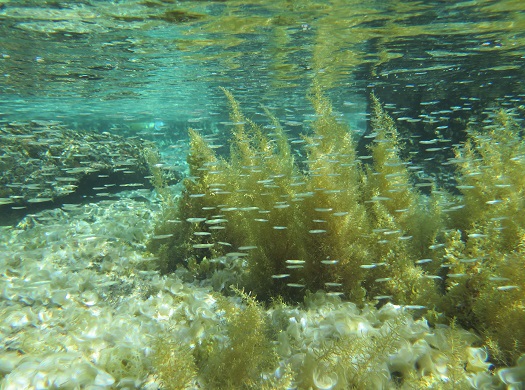Using AI to control energy for indoor agriculture
30 September 2024
Published online 21 August 2019
Transport of macroalgae far into the oceans contributes significantly to marine carbon sequestration.

© Alejandra Ortega
The carbon in marine ecosystems, known as “blue carbon”, is a significant part of the global carbon cycle and is of great interest due to the role of carbon dioxide in climate change. Quantifying blue carbon is important for understanding the role of marine systems in locking up carbon that might otherwise be released into the atmosphere as CO2. The significance of seaweed, formally called macroalgae, in the blue carbon budget is hotly debated, partly due to the difficulty in determining how much macroalgae spread from coastal regions into the deeper sea.
Researchers led by Carlos Duarte at the King Abdullah University of Science and Technology (KAUST) in Saudi Arabia have now provided strong evidence for the substantial export of macroalgae beyond their typical coastal habitats.
The research is based on the genetic analysis of ocean samples collected from around the world during circumnavigations by several research ships. The sampling was originally done primarily to investigate plankton diversity, but Duarte and his colleagues realized that the data could also hold information about the spread of macroalgae.
“We discovered fingerprints of macroalgal export in the global ocean which had been overlooked in previous analyses,” Duarte reports. This missed opportunity to detect the macroalgal DNA was spread across many earlier studies of DNA from the ocean conducted over 15 years.
Duarte explains that efficiently probing the massive amount of previously collected data was made possible by a computational analysis system and the use of the KAUST supercomputer facilities. “This gave us an advantage, in terms of computational capacities, relative to other research groups worldwide," says Duarte.
Marine biologist John Raven of the University of Dundee, UK, acknowledges the study’s significance. “It adds substantially to our understanding of carbon sequestration in the ocean and paves the way to further quantification of macroalgal carbon storage and the dominant groups of algae involved,” Raven says. The KAUST team is now pursuing these deeper investigations.
doi:10.1038/nmiddleeast.2019.114
Ortega, A., Geraldi, N. R. et al. Important contribution of macroalgae to oceanic carbon sequestration. Nature Geoscience https://doi.org/10.1038/s41561-019-0421-8 (2019).
Stay connected: